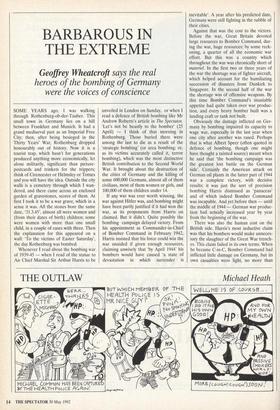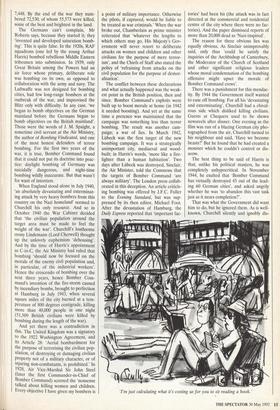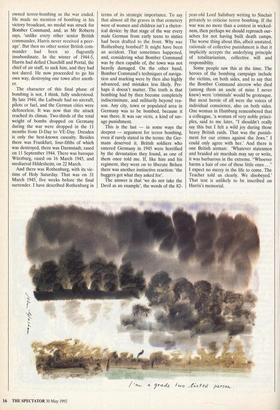BARBAROUS IN THE EXTREME
Geoffrey Wheatcroft says the real
heroes of the bombing of Germany were the voices of conscience
SOME YEARS ago, I was walking through Rothenburg-ob-der-Tauber. This small town in Germany lies on a hill between Frankfurt and Munich. It had a grand mediaeval past as an Imperial Free City; then, after being besieged in the Thirty Years' War, Rothenburg dropped honourably out of history. Now it is a tourist trap, which hasn't for generations produced anything more economically, let alone militarily, significant than picture- postcards and trinkets for the trippers; think of Cirencester or Helmsley or Totnes and you will have the idea. Outside the city walls is a cemetery through which I wan- dered, and there came across an enclosed garden of gravestones, scores of them. At first I took it to be a war grave, which in a sense it was. All the stones bore the same date, '31.3.45', almost all were women and (from their dates of birth) children; some were women with more than one small child, in a couple of cases with three. Then the explanation for this appeared on a wall: 'To the victims of Easter Saturday', the day Rothenburg was bombed.
Whenever I read about the bombing war of 1939-45 — when I read of the statue to Air Chief Marshal Sir Arthur Harris to be unveiled in London on Sunday, or when I read a defence of British bombing like Mr Andrew Roberts's article in The Spectator, `Let's not be beastly to the bomber' (25 April) — I think of that morning in Rothenburg. Those buried there were among the last to die as a result of the `strategic bombing' (or area bombing; or, as its victims accurately called it, terror bombing), which was the most distinctive British contribution to the Second World War. It brought about the destruction of the cities of Germany and the killing of some 600,000 Germans, almost all of them civilians, most of them women or girls, and 100,000 of them children under 14.
If any war was ever worth winning, the war against Hitler was, and bombing might have been partly justified if it had won the war, as its proponents from Harris on claimed. But it didn't. Quite possibly the bombing campaign delayed victory. From his appointment as Commander-in-Chief of Bomber Command in February 1942, Harris insisted that his force could win the war unaided if given enough resources, claiming unwisely that 'by April 1944' his bombers would have caused 'a state of devastation in which surrender is inevitable'. A year after his predicted date, Germans were still fighting in the rubble of their cities.
Against that was the cost to the victors. Before the war, Great Britain devoted large resources to Bomber Command, dur- ing the war, huge resources: by some reck- oning, a quarter of all the economic war effort. But this was a country which throughout the war was chronically short of materiel. In the first two or three years of the war the shortage was of fighter aircraft, which helped account for the humiliating succession of disasters from Dunkirk to Singapore. In the second half of the war the shortage was of offensive weapons. By this time Bomber Command's insatiable appetite had quite taken over war produc- tion, and every heavy bomber built was a landing craft or tank not built.
Obviously the damage inflicted on Ger- many by bombing impaired its capacity to wage war, especially in the last year when one city after another was rased. Perhaps that is what Albert Speer (often quoted in defence of bombing, though one might have thought a tainted source) meant when he said that 'the bombing campaign was the greatest lost battle on the German side'. Certainly the American attack on German oil plants in the latter part of 1944 was a complete victory, with decisive results; it was just the sort of precision bombing Harris dismissed as 'panaceas' and of which indeed Bomber Command was incapable. And yet before then — until the middle of 1944 — German war produc- tion had actually increased year by year from the beginning of the war.
There was also the human cost on the British side. Harris's most seductive claim was that his bombers would make unneces- sary the slaughter of the Great War trench- es. This claim failed in its own terms. When he became C-in-C, Bomber Command had inflicted little damage on Germany, but its own casualties were light, no more than 7,448. By the end of the war they num- bered 72,530, of whom 55,573 were killed, some of the best and brightest in the land.
The Germans can't complain, Mr Roberts says, because they started it; they 'invented and developed saturation bomb- ing'. This is quite false. In the 1920s, RAF squadrons (one led by the young Arthur Harris) bombed rebellious Middle Eastern tribesmen into submission. In 1939, only Great Britain among the Powers had an air force whose primary, deliberate role was bombing on its own, as opposed to collaboration with the army and navy. The Luftwaffe was not designed for bombing cities, had few long-range bombers at the outbreak of the war, and improvised the Blitz only with difficulty. In any case, 'we began to bomb objectives on the German mainland before the Germans began to bomb objectives on the British mainland'. Those were the words of J. M. Spaight, a sometime civil servant at the Air Ministry, the author of Bombing Vindicated, and one of the most honest defenders of terror bombing. For the first two years of the war, it is true, Bomber Command found that it could not put its doctrine into prac- tice: daylight bombing of Germany was suicidally dangerous, and night-time bombing wildly inaccurate. But that wasn't for want of intention.
When England stood alone in July 1940, 'an absolutely devastating and exterminat- ing attack by very heavy bombers from this country on the Nazi homeland' seemed to Churchill his only resource. And so in October 1940 the War Cabinet decided that 'the civilian population around the target area must be made to feel the weight of the war'. Churchill's loathsome crony Lindemann (Lord Cherwell) thought up the unlovely euphemism `dehousing'. And by the time of Harris's appointment as C-in-C, the Air Ministry had ruled that bombing 'should now be focused on the morale of the enemy civil population and, in particular, of the industrial workers'. Hence the crescendo of bombing over the next three years, hence Bomber Com- mand's invention of the fire-storm caused by incendiary bombs, brought to perfection at Hamburg in July 1943, when several square miles of the city burned at a tem- perature of 800 degrees centigrade, killing more than 40,000 people in one night (51,509 British civilians were killed by bombing during the length of the war).
And yet there was a contradiction in this. The United Kingdom was a signatory to the 1922 Washington Agreement, and its Article 28: 'Aerial bombardment for the purpose of terrorising the civilian pop- ulation, of destroying or damaging civilian property not of a military character, or of injuring non-combatants, is prohibited.' In 1928, Air Vice-Marshal Sir John Steel (later the first Commander-in-Chief of Bomber Command) scorned the 'nonsense talked about killing women and children. Every objective I have given my bombers is a point of military importance. Otherwise the pilots, if captured, would be liable to be treated as war criminals.' When the war broke out, Chamberlain as prime minister reiterated that 'whatever the lengths to which others may go, His Majesty's Gov- ernment will never resort to deliberate attacks on women and children and other civilians for the purpose of mere terror- ism', and the Chiefs of Staff also stated the policy of 'refraining from attacks on the civil population for the purpose of demor- alisation'.
The conflict between these declarations and what actually happened was the weak- est point in the British position, then and since. Bomber Command's exploits were built up to boost morale at home (in 1942 it needed boosting). And yet at the same time a pretence was maintained that the campaign was something less than terror bombing. The result was another cam- paign; a war of lies. In March 1942, Lubeck was the first target of the new bombing campaign. It was a strategically unimportant city, mediaeval and wood- built; in Harris's words, 'more like a fire- lighter than a human habitation'. Two days after Liibeck was destroyed, Sinclair, the Air Minister, told the Commons that the targets of Bomber Command 'are always military'. The London press collab- orated in this deception. An article criticis- ing bombing was offered by J.F.C. Fuller to the Evening Standard, but was sup- pressed by its then editor, Michael Foot. After the devastation of Hamburg, the Daily Express reported that 'important fac-
tories' had been hit (the attack was in fact directed at the commercial and residential centre of the city where there were no fac- tories). And the paper dismissed reports of more than 20,000 dead as 'Nazi-inspired'.
The reason for these obvious lies was equally obvious. As Sinclair unimprovably said, only thus 'could he satisfy the inquiries of the Archbishop of Canterbury, the Moderator of the Church of Scotland and other significant religious leaders whose moral condemnation of the bombing offensive might upset the morale of Bomber Command crews'.
There was a punishment for this mendac- ity. By 1944 the Government itself wanted to ease off bombing. For all his 'devastating and exterminating', Churchill had a chival- rous side which disliked killing civilians. Guests at Chequers used to be shown newsreels after dinner. One evening as the film was run of a blazing German city pho- tographed from the air, Churchill turned to his neighbour and said, 'Have we become beasts?' But he found that he had created a monster which he couldn't control or dis- avow.
The best thing to be said of Harris is that, unlike his political masters, he was completely unhypocritical. In November 1944, he exulted that 'Bomber Command has virtually destroyed 45 out of the lead- ing 60 German cities', and asked angrily whether he was 'to abandon this vast task just as it nears completion?'.
That was what the Government did want him to do, but he ignored them. As is well- known, Churchill silently and ignobly dis-
I'm just calculating what it's costing us for you to sit reading a book.'
owned terror-bombing as the war ended. He made no mention of bombing in his victory broadcast, no medal was struck for Bomber Command, and, as Mr Roberts says, 'unlike every other senior British commander, Harris never received a peer- age'. But then no other senior British com- mander had been so flagrantly insubordinate. In the winter of 1944-5, Harris had defied Churchill and Portal, the chief of air staff, to sack him, and they had not dared. He now proceeded to go his own way, destroying one town after anoth- er.
The character of this final phase of bombing is not, I think, fully understood. By late 1944, the Luftwafe had no aircraft, pilots or fuel, and the German cities were defenceless. It was now that the attack reached its climax. Two-thirds of the total weight of bombs dropped on Germany during the war were dropped in the 11 months from D-Day to VE-Day. Dresden is only the best-known casualty. Besides there was Frankfurt, four-fifths of which was destroyed, there was Darmstadt, rased on 11 September 1944. There was baroque Wiirzburg, rased on 16 March 1945, and mediaeval Hildesheim, on 22 March.
And there was Rothenburg, with its vic- tims of Holy Saturday. That was on 31 March 1945, five weeks before the final surrender. I have described Rothenburg in
terms of its strategic importance. To say that almost all the graves in that cemetery were of women and children isn't a rhetor- ical device: by that stage of the war every male German from early teens to sixties had been drafted to the front. Why was Rothenburg bombed? It might have been an accident. That sometimes happened, and, considering what Bomber Command was by then capable of, the town was not heavily damaged. On the other hand, Bomber Command's techniques of naviga- tion and marking were by then also highly advanced, and mistakes less likely. Per- haps it doesn't matter. The truth is that bombing had by then become completely indiscriminate, and militarily beyond rea- son. Any city, town or populated area in Germany was to be bombed, because it was there. It was vae victis, a kind of sav- age punishment.
This is the last — in some ways the deepest — argument for terror bombing, even if rarely stated in the terms: the Ger- mans deserved it. British soldiers who entered Germany in 1945 were horrified by the devastation they found, as one of them once told me. If, like him and his regiment, they went on to liberate Belsen there was another instinctive reaction: 'the buggers got what they asked for'.
The answer is that 'we do not take the Devil as an example', the words of the 82- year-old Lord Salisbury writing to Sinclair privately to criticise terror bombing. If the war was no more than a contest in wicked- ness, then perhaps we should reproach our- selves for not having built death camps. The worse thing about this, albeit unstated, rationale of collective punishment is that it implicitly accepts the underlying principle of totalitarianism, collective will and responsiblity.
Some people saw this at the time. The heroes of the bombing campaign include the victims, on both sides, and to say that the Bomber Command aircrew who died (among them an uncle of mine I never knew) were 'criminals' would be grotesque. But most heroic of all were the voices of individual conscience, also on both sides. One woman in Hamburg remembered that a colleague, 'a woman of very noble princi- ples, said to me later, "I shouldn't really say this but I felt a wild joy during those heavy British raids. That was the punish- ment for our crimes against the Jews." I could only agree with her.' And there is one British airman: 'Whatever statesmen and braided air marshals may say or write, it was barbarous in the extreme. "Whoever harms a hair of one of these little ones ..." I expect no mercy in the life to come. The Teacher told us clearly. We disobeyed.' That text is unlikely to be inscribed on Harris's memorial.
/ by 4 yr-a-de / tv-0 e r-5 0


















































 Previous page
Previous page